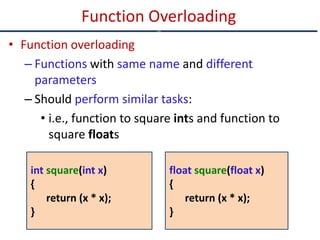The document discusses functions and static variables in C++. It covers topics like:
- Creating functions, invoking functions, and passing arguments to functions.
- Determining the scope of local and global variables.
- Understanding the differences between pass-by-value and pass-by-reference.
- Using function overloading and dealing with ambiguous overloading.
- Using function prototypes for declaring function headers.
- Knowing how to use default arguments.
- Static variables.
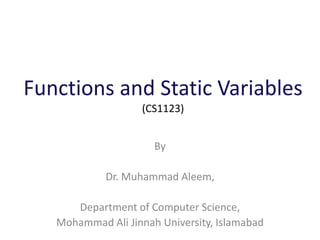


















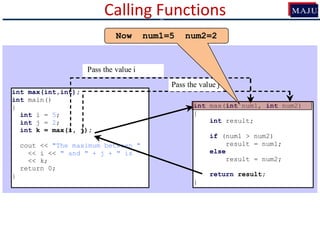




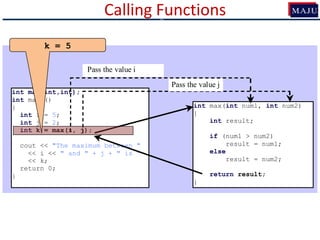

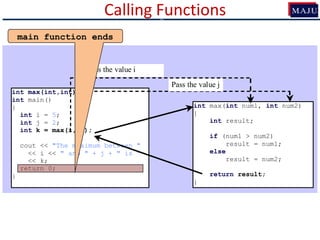










![Passing an Array to a Function
• When passing an array to a function, we need to tell
the compiler what the type of the array is and give
it a variable name, similar to an array declaration
float a[]
• We don’t want to specify the size so function can
work with different sized arrays.
• Size comes in as a second parameter
This would be a formal parameter
c](https://image.slidesharecdn.com/cs11238functions-140511101149-phpapp02/85/Cs1123-8-functions-38-320.jpg)
![Passing an Array to a Function
int Display(int data[], int N)
{ int k;
cout<<“Array contains”<<endl;
for (k=0; k<N; k++)
cout<<data[k]<<“ “;
cout<<endl;
}
int main()
{
int a[4] = { 11, 33, 55, 77 };
Display(a, 4);
}
An int array
parameter
of unknown size
The size of
the array
The array
argument, no []
c](https://image.slidesharecdn.com/cs11238functions-140511101149-phpapp02/85/Cs1123-8-functions-39-320.jpg)
![43
Passing an Array to a Function
#include <iostream.h>
int sum(int data[], int n); //PROTOTYPE
void main()
{
int a[] = { 11, 33, 55, 77 };
int size = sizeof(a)/sizeof(int);
cout << "sum(a,size) = " << sum(a,size) << endl;
}
int sum(int data[], int n)
{
int sum=0;
for (int i=0; i<n;i++)
sum += data[i];
return sum;
}
An int array
parameter
of unknown size
The size of the array
The array argument, no []
c](https://image.slidesharecdn.com/cs11238functions-140511101149-phpapp02/85/Cs1123-8-functions-40-320.jpg)
![Arrays are always Pass By Reference
• Arrays are automatically passed by reference.
• Do not use &.
• If the function modifies the array, it is also modified in
the calling environment.
//Following function sets the values of an array to 0
void Zero(int arr[], int N)
{
for (int k=0; k<N; k++)
arr[k]=0;
}
c](https://image.slidesharecdn.com/cs11238functions-140511101149-phpapp02/85/Cs1123-8-functions-41-320.jpg)
